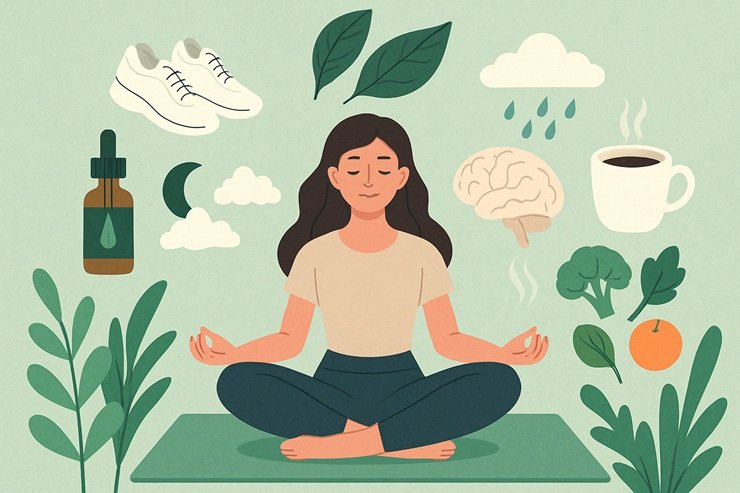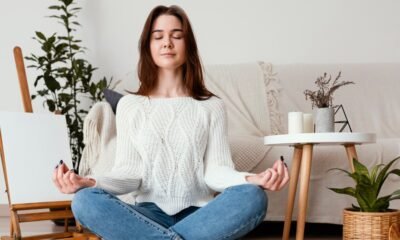Health
8 Science-Backed Ways to Reduce Anxiety Naturally
Anxiety can feel overwhelming, but natural remedies may offer relief. Backed by science, these eight strategies promote calmness and emotional balance—without medication.

Anxiety is a natural part of life. It’s your body’s response to stress and potential threats. But when it becomes chronic or overwhelming, it can interfere with your peace of mind, productivity, and overall well-being. While medication and therapy are effective options, there are also several natural strategies—supported by science—that can help you manage anxiety and feel more in control.
If you’re looking for gentle, sustainable ways to ease anxiety, these eight natural methods might be just what you need.
1. Exercise Regularly
The science: Numerous studies have found that physical activity significantly reduces symptoms of anxiety. When you exercise, your body releases endorphins—natural chemicals that boost mood and relieve stress. It also helps regulate sleep and lowers cortisol levels (the stress hormone).
How to do it: You don’t need intense workouts. A brisk 30-minute walk, yoga, swimming, or cycling a few times a week can make a big difference. Aim for consistency over intensity.
Bonus tip: Try exercising outdoors. Nature itself is calming, and combining the two can amplify the benefits.
2. Practice Deep Breathing and Meditation
The science: Mindfulness meditation and deep breathing techniques activate the parasympathetic nervous system, which calms the “fight or flight” response. Research shows that even short sessions of meditation can reduce anxiety levels.
How to do it: Start with just 5–10 minutes a day. Try guided meditations through apps like Headspace or Calm. Or simply sit quietly, close your eyes, and focus on your breath—inhale slowly for four counts, hold for four, exhale for four.
Bonus tip: The 4-7-8 breathing method is especially effective for calming anxious thoughts.
3. Limit Caffeine and Alcohol
The science: Caffeine is a stimulant that can trigger or worsen anxiety by increasing heart rate and nervousness. Alcohol, while initially calming, disrupts sleep and can heighten anxiety in the long run. Studies have linked both substances to increased anxiety symptoms.
How to do it: Monitor how caffeine and alcohol affect you personally. Consider switching to decaf, herbal tea, or limiting alcohol to social occasions only.
Bonus tip: Drink more water! Dehydration can also impact mood and energy levels.
4. Get Enough Quality Sleep
The science: Poor sleep and anxiety feed each other. Lack of rest makes you more emotionally reactive and less resilient to stress. Research has shown that people who sleep poorly are significantly more likely to experience anxiety symptoms.
How to do it: Create a wind-down routine—dim the lights, avoid screens an hour before bed, and try calming activities like reading or a warm bath. Stick to a consistent sleep schedule, even on weekends.
Bonus tip: Consider natural sleep aids like magnesium, lavender, or chamomile tea (with your doctor’s okay).
5. Spend Time in Nature

The science: Nature therapy—or “ecotherapy”—has been found to reduce cortisol levels, lower blood pressure, and boost mood. One study found that just 20 minutes in nature significantly reduces stress hormones.
How to do it: Take a daily walk in the park, go hiking, or simply sit under a tree. Even short moments outside—without your phone—can make a difference.
Bonus tip: Forest bathing (a Japanese practice known as shinrin-yoku) is particularly effective for calming anxiety.
6. Eat a Balanced, Nutrient-Rich Diet
The science: Your brain and gut are closely connected, and what you eat affects your mental health. Diets rich in omega-3 fatty acids, magnesium, and probiotics have been shown to reduce anxiety symptoms.
How to do it: Eat more whole foods—leafy greens, berries, nuts, seeds, fatty fish (like salmon), and fermented foods (like yogurt, kimchi, and kefir). Avoid processed foods and refined sugars.
Bonus tip: Consider speaking with a nutritionist to personalize your anti-anxiety meal plan.
7. Journal Your Thoughts
The science: Expressive writing can reduce anxiety by helping you process emotions and organize your thoughts. Journaling gives you a safe space to explore what’s bothering you and release pent-up feelings.
How to do it: Spend 10–15 minutes each day writing whatever comes to mind. You can also try specific prompts like “What’s making me anxious right now?” or “Three things I’m grateful for today.”
Bonus tip: Try gratitude journaling—it has been shown to increase optimism and reduce stress.
8. Build Strong Social Connections
The science: Human connection is a powerful antidote to anxiety. Studies show that social support acts as a buffer against stress and improves emotional resilience.
How to do it: Spend time with friends or family, even virtually if needed. Join a club, attend a class, or volunteer. Sometimes, just talking to someone who understands can make all the difference.
Bonus tip: If you’re feeling isolated, consider joining a support group for anxiety—many are available online.
Final Thoughts
Anxiety may not disappear overnight, but with small, intentional changes, you can build a healthier and calmer life. These science-backed methods are gentle, effective, and empowering tools to help you take back control—naturally.
Try one or two at a time, and see what resonates with you. Over time, you’ll likely find a rhythm and routine that not only soothes anxiety but brings more joy and balance into your everyday life.
-

 Motivation6 months ago
Motivation6 months agoHow to Create a Powerful Vision Board (2025)
-

 Quotes6 months ago
Quotes6 months ago50 Comfort Zone Quotes to Inspire Growth and Change
-

 Lifestyle6 months ago
Lifestyle6 months agoTop 10 Destinations for Digital Nomads in 2025
-

 Lifestyle8 months ago
Lifestyle8 months agoHow to Cultivate Gratitude and Positivity in Your Daily Life
-

 Health8 months ago
Health8 months agoWhy Good Nutrition Matters More Than You Think
-

 Travel6 months ago
Travel6 months ago10 Life-Changing Lessons You Learn Only Through Traveling
-

 Success6 months ago
Success6 months agoCan Money Truly Buy Happiness? Exploring the Connection
-

 Travel7 months ago
Travel7 months agoTravel Like a Pro: Secrets to Packing Light and Smart



















